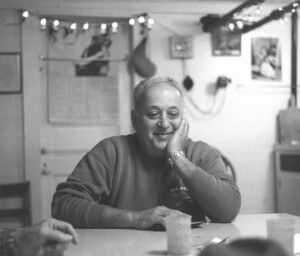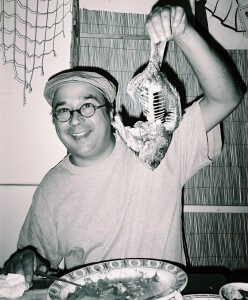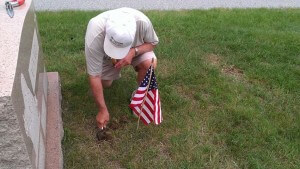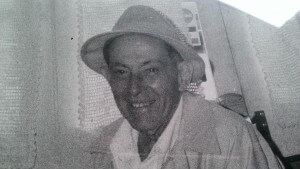“Old man, take a look at my life … I’m a lot like you were …”
– Neil Young
My father and I went to the graveyard in East Baltimore on Father’s Day to visit his father. We took grass clippers, a clean rag and a small vial of red table wine.
Dad – Manuel – is 79; I am 55, with a grown son named Manuel. Dad’s father – Rafael, born in Spain – was 86 when he died on the Eastern Shore in 1990. In the plot next to the old Spaniard at Holy Redeemer Cemetery off of German Hill Road in Dundalk lies his wife Frances.

Manuel Alvarez, born 1934
Grandpop outlived his Italian-American bride (Highlandtown by-way-of Aliquippa, Pa.) by a decade-and-a-half. For most of those 14 intervening years, my father would drive to Greektown to pick up his father with a pair of clippers and a clean rag to manicure the grave. Along the way, they’d stop for flowers and debate what color bouquet she might like best. Frances was legally blind.
I don’t remember accompanying them back then (I guess I was busy, eh Mr. Chapin?) but that’s what my old man and I decided to do on Father’s Day just past: hop in the car, take a ride, visit the family.
We pulled in the gates, had the conversation we always do about just where the grave is (in between a whole lot of German and Italian families, that’s for sure) and pulled up to a pink stone carved with an image of the Blessed Mother. The marker was designed by my father’s brother, Victor Alvarez, a retired tool and die maker who graduated from Baltimore’s Mergenthaler High School in 1955.

Rafael Alvarez, born 1958
The grounds were well cared for, the clippers (brand new from Costco, my father had been using a pair of impossibly dull ones he took to the grave when my grandfather was still alive) unnecessary.
I began wiping off the stone with the white rag my Pop keeps in the back of his car but it was dry and not doing the job. A nice lady nearby offered a couple of wet wipes and soon the stone was reflecting the bright afternoon sun.
And then, once the little chores are taken care of, what do you do?

Manuel Alvarez at his parents’ grave
You stand and remember or try not to remember; maybe you kneel on one knee if you want to talk to the dead or get down on two if you are praying for them (and your own intentions, our tears always for us.)
Dad talked a little bit about how hard his father worked in this life, a common day laborer at the Bethlehem Steel plant in Sparrows Point until World War II came along and the company trained the willing and able for more sophisticated work. My grandfather stepped forward and became an outside machinist. The war was good for prosperity (he was able to buy his first car) and my father too young to fight it.
Before we left, my Dad took out the tiny jar of red table wine – the kind his father used to make in the basement on Macon Street, the kind he drank with every evening meal – and poured it onto the grass.
“SALUD!” we said, as we still do around the dinner table, clinking little juice glasses after grace and before the meal.
Standing up on his one good knee (the one that was replaced, the other scheduled for surgery later this year) my father touched the top of the headstone and said, “Bye, Pop.”
And then we drove back to my parents’ house in the suburbs for an afternoon of Orioles’ baseball and homemade gnocchi (potatoes boiled and riced into thumb-sized pillows of dough.)
As we ate – gnocchi and sauce with meatballs, small pieces of pork in the pot to sweeten – my son called from Philadelphia to wish his old man a Happy Father’s Day.
I hope we don’t need those grass clippers anytime soon.


More wine with loved ones, less clipping. May your father receive his new knee without problems and join you in many more trips to visit your grandfather. Salud!
Absolutely wonderful, as always.
great story Rafael
Thanks, Ralphie. Excellent!
Another beautiful piece by Mr. Alvarez. Thank you for sharing your Father’s Day with us and for continuing to document the rituals of family and family histories that help us all feel a little more connected.
What an intimate story. Very well written and a joy to read.
Lovely memories, Rafael. I really enjoyed this story. Keep ’em coming!